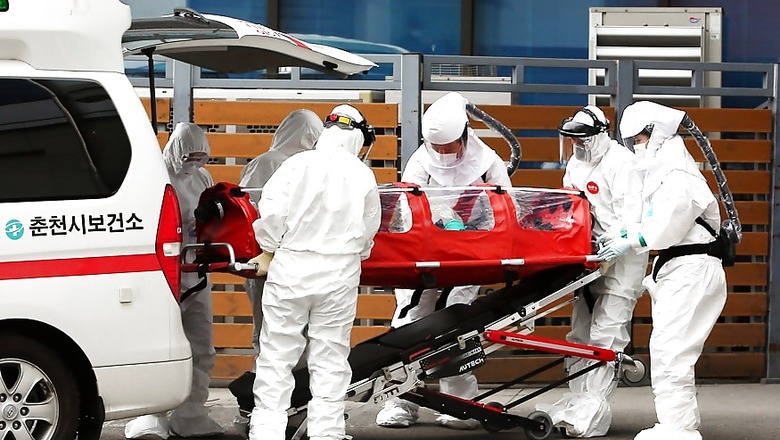
views
Coronavirus, or COVID-19, is showing no signs of slowing down. The virus is now a more global problem than ever before. 893 reported cases of Coronavirus in South Korea, 229 in Italy, 160 in Japan and 90 in Singapore, to name a few countries worst hit along with China—and counting. The World Health Organization (WHO) as well as authorities around the world are still at a loss to explain the sudden surge in cases in Italy, Iran and South Korea over the past few days. But the one thing that authorities are convinced about are the superspreaders, the Coronavirus’ secret weapon.
Italian authorities believe that a still-to-be-tracked superspreader is the source of the virus in the country. The biggest jump in cases of COVID-19 has been reported in Lombardy, which includes the financial capital Milan, with around 100 confirmed cases. Patient Zero, as they are calling the person, remains unidentified. South Korean authorities have identified a 61-year old woman who attends the Shincheonji Church of Jesus the Temple of the Tabernacle of the Testimony in Daegu as the possible superspreader—she has been labelled "Patient 31" by the Center for Disease Control and Prevention in South Korea. She has not travelled abroad recently, and The Guardian reported on February 20 that around 37 fellow churchgoers have already tested positive for Coronavirus and another 52 are showing symptoms. “We've asked [all members of the church] to stay at home, isolated from their families,” Daegu Mayor Kwon Young-jin, told the media.
The Coronavirus’ has a trump card, the superspreader, much like SARS before it. But what is a super spreader? While there is no strict medical definition for this term as yet, it usually refers to the person who is infected by a particular virus or disease and subsequently spreads the infection to significantly more people than someone else also infected by the same virus or disease. A typical infection spreader follows the traditional steps. He or she catches a virus but would likely not know about it at this point. Then as carriers, they each infect people in close proximity, completely unknowingly. Science is at a consensus that this spread is usually 2.6 people per person, on an average. Subsequently, the carrier and ones the infection was spread to show the symptoms and are taken into quarantine for treatment. But a super-spreader works a bit differently. A super-spreader also catches the virus or infection much like everyone else, but unknowingly spreads it to 8 people on an average immediately, as against 2.6 people that someone else would. If like the Coronavirus, the infection stays in the body for up to 14 days before showing symptoms, the spread can continue without the superspreader or anyone in their vicinity realising it.
ALSO READ | This Scary Map Shows How Coronavirus May Be Spreading Globally Through Wuhan Travellers
In China, there is a 20-year old woman who has become the first case that indicates that a person can spread Coronavirus to others without actually showing any symptoms themselves. The Wuhan native is under observation at the Fifth People's Hospital of Anyang after having believed to have passed on the COVID-19 virus to 5 family members—they insist she is the only relative who had been to Wuhan recently. It has already been reported that the Coronavirus incubation period may be much longer than the previously thought 14-days, and instead could be as high as 27-days before the first symptoms show up.
The World Health Organization (WHO) Director General Tedros Adhanom Ghebreyesus has already explained that the name COVID-19 comes from "co" which stands for "corona", "vi" for "virus" and "d" for "disease". Therefore the name COVID-19 and also known as 2019-nCoV.
ALSO READ | Coronavirus Scare Has People Searching For Answers; Google Lists The Common Questions
Earlier, reports out of Hong Kong suggest that a super spreader at the high-rise tower called Hong Mei House in north-western Hong Kong's Tsing Yi has put more than 3000 residents at risk, after the Coronavirus appeared to have spread inside the complex via pipes and ducts. According to a study published in JAMA on February 7 which analysed as many as 138 confirmed Coronavirus cases in Wuhan confirms that some people may pass on the virus more readily than the average person. “One reason for the rapid spread may be related to the atypical symptoms in the early stage in some patients infected with nCoV,” says the research.
Briton Steve Walsh is perhaps the most high profile among the Coronavirus super spreaders thus far. It is believed that Walsh caught the virus, at that point unknown to him, in Singapore. He then made a long journey home, via a ski resort in The Alps, and ended up infecting as many as 11 people along the way. He has since recovered, but the weight of being the reason for 11 other people catching Coronavirus because of him, is clearly weighing heavily.
There is no scientific explanation for how some infected people become super spreaders. But the virus uses some human carriers in a way that the infection spreads to more people than the average. “In most outbreaks you’ll find super spreaders but we don’t really understand the mechanism. What we often think is these people are producing lots of virus, and that generally translates to lots of transmission potential. But why do certain people produce lots of virus? We’re unsure,” Jonathan Ball, professor of molecular virology at the University of Nottingham, said to The Telegraph.
ALSO READ | Coronavirus: This Website Has A Realtime Map Tracking The Deadly Virus in All Countries
The main signs of the Coronavirus infection are high fever, cough, cold and a shortness of breath. In short, typical flu symptoms at first. Doctors suggest that frequently washing your hands with soap, using hand sanitizers regularly, avoid touching your eyes, nose or mouth and avoiding contact with a potentially infected human can reduce the chances of the spread of infection.




















Comments
0 comment